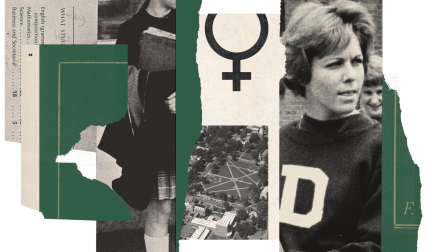Hair Raiser
A report from Commencement held on September 19, 1787, in Dartmouth Hall: “A number of spectators climbed up the sides of the official platform, and it suddenly collapsed, and dignitaries and spectators were scattered promiscuously on the floor. Some of the reverend gentlemen, we are told, ‘had to look for themselves in one place, and for their wigs in another.’ ”
Food Fright
After hearing from early students about the College’s vile victuals, N.H. Gov. Wentworth wrote Wheelock that students were “unhealthy and debilitated, their constitutions impaired, and their friends and parents highly disgusted.”
Home Equity
Students dismantled Wheelock’s decaying log hut in the early 1780s despite the protests of some professors.
Slow Start
Only six trustees attended the first board meeting on October 11, 1770. One trustee short of a quorum, the 12-member board had to reassemble 11 days later.
Squirmy Situation
A bizarre plague of worms in July 1770 led to food shortages during Wheelock’s first winter (1770-71). The worms, up to four inches long, reportedly covered houses “within and without…but left no wheat or corn behind them.” The inexplicable invaders were brown with black and yellow stripes. The only remedy that worked: digging trenches where accumulated worms could be crushed.
Sunken Treasure
When a ship sank off Cape Cod in 1784, a fund of £5,000 (nearly $1 million today) headed to College coffers went down with it. As a result, the College held a lottery to fund Dartmouth Hall.
Lord of the Flies
“Samuel Taggart, 1774, was absentminded and eccentrick, caught flies in prayers at the college chapel, and being reproved for inattention, vindicated himself by repeating all that had been said in the devotion.”
Long Line of Professors
One family served the College for 135 years: Ebenezer Adams, class of 1791, taught mathematics at the College from 1810 until 1833, when he was succeeded by his son-in-law, Ira Young, whose son Charles taught astronomy. Charles’ daughter married John C. Proctor, a professor of Greek from 1870 to 1879, and their son, Charles Proctor, class of 1900, became an assistant professor of mathematics and later physics. He retired in 1945.
Serious Titles
Lately received at Hanover Bookstore, October 1799: St. Pierre’s Studies of Nature, Winterbotham’s History of China, Robison’s Proof of a Conspiracy of the Illuminati…, and Elliot’s Medical Pocket Book.
John Wheelock’s Rules, Part I
“That no scholar send for or procure any spiritous liquors without a permit from the President or a Tutor for which he shall apply in person unless especially detained at which time he may send for one by a Freshman by whom he shall assign the reason for not coming himself….”
Wheelock’s Rules, Part II
“That no student be absent from his study after nine o’clock at night without liberty or such occasion as President or Tutors shall think sufficient on penalty of one shilling lawful money.” (Fines often served as punishments.)
Wheelock’s Rules, Part III
“It is earnestly recommended and injoyned upon the students that they observe neatness and cleanliness in their rooms and in their dress and avoid every practice in, upon or about the College that may be disagreeable and offensive.”
Schemes With Stripes
A stuffed zebra housed in the College Museum was a regular target of campus pranks in the 1790s. “Unlike a properly regulated museum piece, it was in the habit of appearing in incongruous places, such as the roof of the chapel or the belfry of [Dartmouth Hall], thus requiring laborious transportation back to its normal abode.”
Probably Didn’t Taste Like Chicken
As a student, Daniel Webster once visited his father’s friends near Hanover. “The only thing they had to eat was a bundle of green grass and a little hog’s lard; and they actually subsisted on this grass fried in the hog’s fat,” it was reported. But Webster didn’t mind: “It was not so bad. They fried up a great platter of it and I made my supper and breakfast off it.”
Horse Thief?
Notice in the local paper in December 1799: “Strayed or Stolen. From a pasture in Hanover…a dark gray Mare, four years old, about 13 or 14 hands high—trots all. Whoever has taken up said mare, and will give information where she may be obtained, shall be handsomely rewarded.”
—Thaddeus Osgood
Student, Dartmouth College
Dubious News
The Dartmouth boldly claims to be “America’s oldest college newspaper,” but at least seven other college newspapers make similar claims. The D traces its lineage to the 1799 Dartmouth Gazette—a paper that had no ties to the College.
Mourning Bands
After George Washington died in 1799, Dartmouth’s president and executive officers donned black crepe on their arms for two months to mourn his passing
Higher Standard
President Francis Brown served this notice to men seeking admission in 1816: “They must be versed in common Arithmetick as far as the Square Root.”
Early Press
For a short time, Dartmouth Hall was home to one of the first known printing presses in the colonies. The press was housed there in 1779 by publishers Alden Spooner and Judah-Padock Spooner of the weekly Dresden Mercury and The Universal Intelligencer.
God Help Us
Eleazar Wheelock proclaimed that the site for his College was “not determined by any private interest or party on earth, but the Redeemer’s.”

